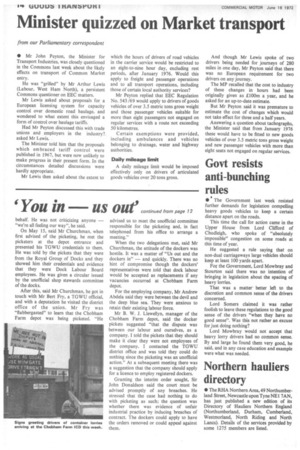Minister quizzed on Market transport
Page 16

If you've noticed an error in this article please click here to report it so we can fix it.
from our Parliamentary correspondent
• Mr John Peyton, the Minister for Transport Industries, was closely questioned in the Commons last week about the likely effects on transport of Common Market entry.
He was "grilled" by Mr Arthur Lewis (Labour, West Ham North), a persistent Commons questioner on EEC matters.
Mr Lewis asked about proposals for a European licensing system for capacity control over domestic road haulage, and wondered to what extent this envisaged a form of control over haulage tariffs.
Had Mr Peyton discussed this with trade unions and employers in the industry? asked Mr Lewis. .
The Minister told him that the proposals which embraced tariff control were published in 1967, but were now unlikely to make progress in their present form. In the circumstances detailed discussions were hardly appropriate.
Mr Lewis then asked about the extent to which the hours of drivers of road vehicles in the carrier service would be restricted to an eight-to-nine hour day, excluding rest periods, after January 1976. Would this apply to freight and passenger operations and to all transport operations, including those of certain local authority services?
Mr Peyton replied that EEC Regulation No. 543 /69 would apply to drivers of goods vehicles of over 3.5 metric tons gross weight and those passenger vehicles suitable for more than eight passengers not engaged on regular services with a route not exceeding 50 kilometres.
Certain exemptions were provided, including ambulances and vehicles belonging to drainage, water and highway authorities.
Daily mileage limit
A daily mileage limit would be imposed effectively only on drivers of articulated goods vehicles over 20 tons gross. And though Mr Lewis spoke of two drivers being needed for journeys of 280 miles in one day, Mr Peyton said that there was no European requirement for two drivers on any journey.
The MP recalled that the cost to industry of these changes in hours had been originally given as £100m a year, and he asked for an up-to-date estimate.
But Mr Peyton said it was premature to estimate the cost of changes which would not take effect for three and a half years.
Answering a question about tachographs, the Minister said that from January 1976 these would have to be fitted to new goods vehicles of over 3.5 metric tons gross weight and new passenger vehicles with more than eight seats not engaged on regular services.




























































































